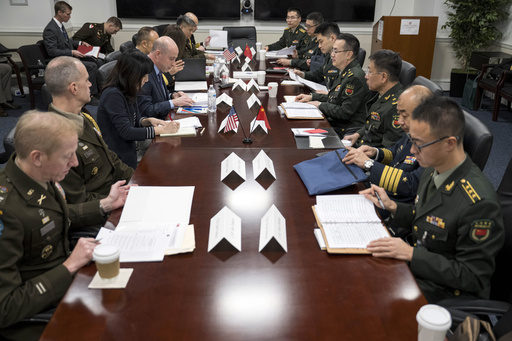
In this photo proved by the Defense Department, Deputy Assistant Secretary of Defense for China, Taiwan, and Mongolia Michael Chase hosts delegates from China for the annual U.S.-PRC Defense Policy Coordination Talks at the Pentagon on Tuesday, Jan. 9, 2024. U.S. and Chinese military officers have resumed talks that were frozen after former House Speaker Nancy Pelosi visited Taiwan in 2022. It’s a development U.S. officials have said is key to keeping the growing competition between the two great powers from turning into direct conflict. (Petty Officer 1st Class Alexander Kubitza/U.S. Navy via A.P.)
WASHINGTON — U.S. and Chinese military officers have resumed talks frozen after former House Speaker Nancy Pelosi visited Taiwan in the summer of 2022, a development U.S. officials have said is key to keeping the growing competition between the two great powers from turning into direct conflict.
During the deputy-level talks at the Pentagon, the two parties discussed setting future meetings between their military officers, including potentially scheduling a future meeting between Defense Secretary Lloyd Austin and newly appointed Chinese Defense Minister Dong Jun.
Austin is currently hospitalized due to complications from prostate cancer treatment. He had not been scheduled to attend Tuesday’s meeting. Dong is a former naval commander appointed in late December after his predecessor, Li Shangfu, was removed from office.
Li was sanctioned by the U.S. in 2018 for buying Russian weapons. After he was named the defense minister in March 2023, the U.S. did not lift the sanctions. No U.S. defense secretary has visited China since Jim Mattis visited in 2018.
The face-to-face meetings follow a call between Gen. CQ Brown Jr., chairman of the Joint Chiefs of Staff, and his counterpart Gen. Liu Zhenli several weeks ago, which marked the first senior military communications between the U.S. and China since August 2022.
Maj headed China’s delegation at the meeting. Gen. Song Yanchao is the deputy director of the Central Military Commission for International Military Cooperation. He met with Michael Chase, the Pentagon’s deputy assistant secretary of defense for China, Taiwan, and Mongolia.While administrative in nature, the two-day talks do allow both sides to raise policy concerns. In a readout of the meeting, the Pentagon said that Chase talked about operational safety in the Indo-Pacific and the United States’ commitment to “our longstanding ‘One China’ policy, which is guided by the Taiwan Relations Act,” the Pentagon said in a readout of the meeting.
“The Department will continue to engage in active discussions with PRC counterparts about future engagements between defense and military officials at multiple levels,” the Pentagon said in the readout.
President Joe Biden and Chinese President Xi Jinping reached the agreement to resume the military talks during their summit in San Francisco last November.
In a briefing with reporters before the meetings, a senior U.S. defense official said while the resumption of the talks is a good sign, “we’re clear-eyed” that significant differences remain between the two militaries, including the implications of China’s movement toward reunification with Taiwan, which could commit the U.S. to aid in Taiwan’s defense. The official spoke to reporters on the condition of anonymity to provide details ahead of the meeting.
Pelosi’s 2022 visit to Taiwan angered China because it claimed the island as part of its territory and viewed visits by foreign government officials as recognition of its sovereignty. She was the highest-ranking American official to visit Taiwan in 25 years.
For the past two years, the Pentagon has faced increased difficulty contacting the Chinese military as the number of intercepts between U.S. and Chinese aircraft and ships sharply rose. According to the Pentagon’s most recent report on China’s military power, Beijing “denied, canceled or ignored” military-to-military communications and meetings with the Pentagon for much of the past two years. The report warned that the lack of such talks “raises the risk of an operational incident or miscalculation spiraling into crisis or conflict.”
